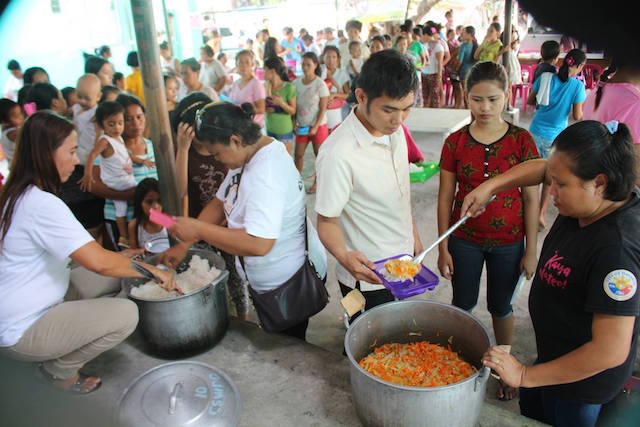Nutrition Program In The Philippine
Nutrition services, includes nutrition rehabilitation program, children receive regular health and malnutrition screenings.
Work with a local government office that aims to reduce the number of malnourished children in Tacloban City. The office monitors malnourished children throughout Tacloban City. Volunteers can work with neighborhood nutrition committees directly and organize educational programs for parents, implement community and school vegetable gardens, and conduct weight surveys of children in different areas. Volunteers with this program should have knowledge of nutrition.
Program Highlights The Philippines has been described as one of the world's best-kept secrets: this nation of 7,000 tropical islands offers pristine white beaches, turquoise waters, ancient rice terraces, virgin rainforests, volcanoes and some of the friendliest people in Asia. Explore this magical place and its diverse culture through an ELI volunteer placement on the historic island of Leyte. All ELI Programs are set up on a completely individual basis according to the interests and skills of each participant and the current needs of the local organizations we work with. Participants in the ELI programs experience the famous hospitality of the Philippines through staying with a local host family.
Community Centers. Education. Health. Health Education. Human Rights.
Nutrition. Public Health. Social Work. Youth. Youth Development Program Duration 2-4 Weeks, 5-8 Weeks, 9-12 Weeks, 3-6 Months Year(s) Offered throughout the year Participation Guidelines Worldwide Participants. This Program is also open to Couples.

Cost in USD per week Contact Provider for Cost Details Program Includes: Pre-departure Support: ELI's expert staff will be happy to assist you with planning your trip Airport Pickup: Participants are met when they arrive at the airport in Tacloban and brought to their homestay In-Country Orientation: Each program starts with a 2-3 day orientation to help participants get their feet on the ground and able to navigate the island. In-country Staff Support: ELI's coordinator in the Philippines has years of experience working with Volunteers She is very resourceful and on call 24/7 in case of emergency.
National Nutrition Survey Philippines
Accommodations: Participants stay in with local host families and experience the warm hospitality of the Philippines and are provided with home cooked meals. Accommodation Options. Home-stays Experience Required Yes. Application Procedures.
Online Application. Other. Transcript. Written Application.
Action © UNICEF Philippines UNICEF trains barangay health workers to administer immunization to children in remote barangays. Health We know what works, and how, but we need to do more to reach the most vulnerable. The UNICEF supports strategy supports the Government’s Universal Health Care Agenda and Poverty Reduction Initiatives to serve the poorest families and most vulnerable groups, particularly women and their new-born babies and beneficiaries of the conditional cash transfer programme. In line with UNICEF’s equity focus on regions identified by the government as the most disadvantaged, the programme will be implemented in areas that have the lowest number and coverage of health facilities and skilled birth attendance while nationally supporting the institutionalization of standards to improve the quality of services for mothers and children along the continuum of care.

By 2014, the UNICEF Health Programme seeks to increase the quality of care, coverage of births attended by skilled birth attendants, and attendants and the number of deliveries in health facilities facility-based deliveries with postnatal and neonatal care among mothers and new-born babies by 15 per cent in 20 identified vulnerable local government units (LGUs) and in urban poor settlements. In line with UNICEF’s thrust to focus on regions identified by the government as the most disadvantaged, the programme will be implemented in the most vulnerable areas that have the lowest number and coverage of health facilities and skilled birth attendance. To ensure that efforts can be sustained and scaled up UNICEF prioritizes fighting the illnesses and conditions that claim the most children’s lives.
To accelerate progress and save far more lives, UNICEF will work mainly with local government units (LGUs) and advocate their efficient use of resources as primary agents of service delivery and systems building.